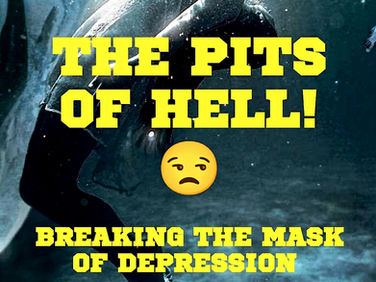The ABC’S of Depression
- divawdep

- Sep 16, 2024
- 2 min read
Breaking the Mask of Depression: Understanding Different Types of Depression and Medications

In this episode of "Breaking the Mask of Depression," I, your host Diva with Depression, delve into the complexities of depression and the various types of mental health medications available. The episode begins with a personal anecdote about a misdiagnosis of bipolar disorder, which sets the stage for a broader discussion on the different forms of depression and the importance of accurate diagnosis.
Types of Depression:
Major Depressive Disorder (MDD): I explain that MDD is a severe form of depression characterized by feelings of worthlessness, suicidal thoughts, and significant changes in weight and sleep patterns.
Persistent Depressive Disorder (PDD): Also known as dysthymia, this is a low-grade, chronic form of depression that can be managed with lifestyle changes and talk therapy.
Bipolar Depression: I touch on the depressive episodes within bipolar disorder and mention that a future episode will cover the differences between Bipolar I and II.
Psychotic Depression: This involves losing touch with reality, including symptoms like paranoia and conspiracy theories.
Seasonal Affective Disorder (SAD): Depression related to changes in seasons, affecting people differently depending on their preferred season.
Postpartum Depression: A serious condition that can occur before or after childbirth, requiring immediate medical attention.
Premenstrual Dysphoric Disorder (PMDD): Severe mood shifts related to the menstrual cycle.
Atypical Depression: Characterized by symptoms like excessive eating and hypersensitivity, though not as extreme as other forms.
Mental Health Medications
Types of Medications: I discuss various classes of antidepressants, including SSRIs, SNRIs, NDRIs, MAOIs, and tricyclics.
Common Medications: Examples include Wellbutrin, Zoloft, Prozac, Cymbalta, and Effexor.
Side Effects: I highlight common side effects like insomnia, dry mouth, headaches, and sexual dysfunction.
The Role of Mental Health Professionals
Psychiatrists vs. Psychologists: I explain the differences between these two types of professionals and their roles in diagnosing and treating mental health conditions.
Importance of a Care Team: Emphasizing the need for a coordinated approach between psychiatrists, psychologists, and primary care doctors.
Therapy Options
Talk Therapy: The benefits of talk therapy, especially for those with low-grade depression.
Inpatient and Outpatient Programs: I share my personal experiences with both types of programs, including the structure and benefits of each.
Final Thoughts
Advocacy: I stress the importance of being well-informed and advocating for oneself in the medical system.
Resources: Directing listeners to my website and Instagram for additional information and support resources.
Conclusion
I encourage listeners to seek professional help if they are struggling with their mental health. I remind them to take care of themselves, find small joys, and maintain their peace and sanity.
Call to Action
Website: Visit https://www.divawithdepression.com/ for more information and resources.
Instagram: Check out my Instagram highlights for emergency contact numbers and additional support. https://www.instagram.com/divawdep?igsh=MWNiZ3l6d2RuZjd6Zg%3D%3D&utm_source=qr
Thank you for tuning in, and I look forward to our next discussion. Stay well and take care!
The ABC’S of Depression:








Comments